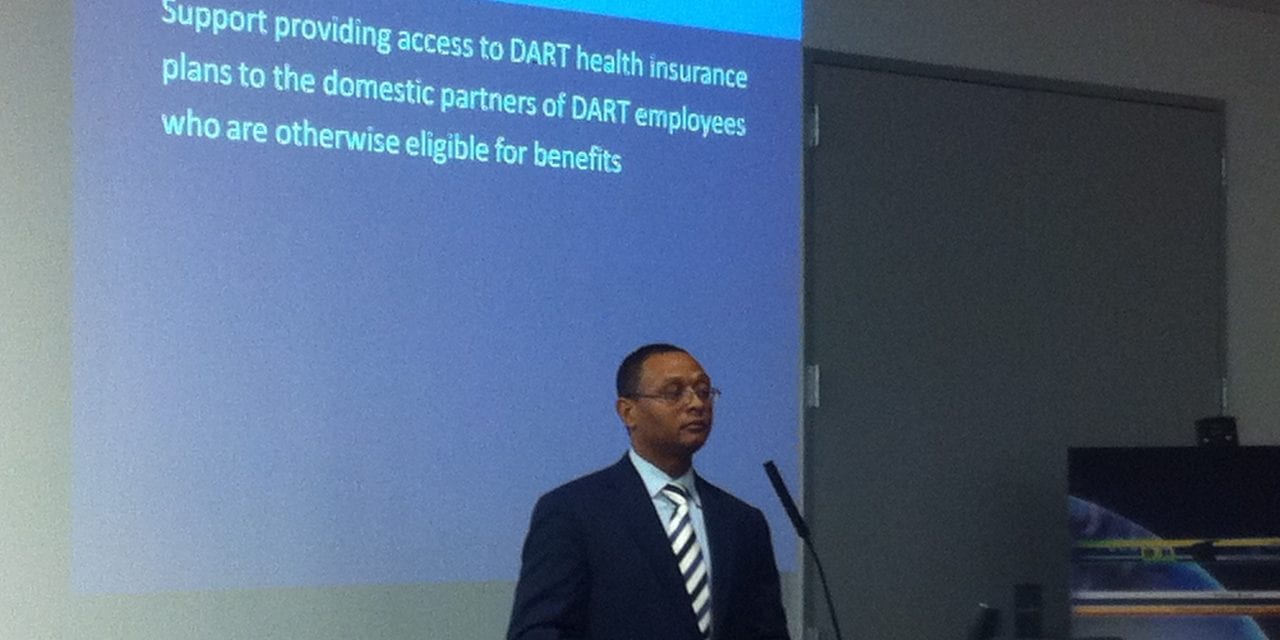
Michael Muhammad, DART’s vice president of diversity and innovative services, addresses the transit agency’s board on Tuesday.
DART’s Board of Directors approved a motion Tuesday to postpone a decision on offering domestic partner benefits until after the U.S. Supreme Court rules in two marriage equality cases.
The board voted 10-1 to postpone the issue until July during a committee-of-the-whole meeting on Tuesday afternoon. The vote to postpone consideration of DP benefits came one month after the committee-of-the-whole voted down a similar amendment 7-6 on Feb. 26.
Rafael McDonnell with Resource Center Dallas said he was disappointed in the outcome and hoped the LGBT community would start calling board members Wednesday morning and demand to know why they voted to postpone a decision.
“I’m deeply and profoundly disappointed in the lack of leadership by the DART board,” McDonnell said afterward.
DART’s administrative committee approved a plan in mid-February that would offer healthcare benefits to employees’ opposite- and same-sex partners and their children.
Michael Muhammad, DART’s vice president of diversity and innovative services, said opinions among DART employees are mixed, with some in favor of offering the benefits and others against it.
“We have employees who fall on both sides of the spectrum,” he said.
Muhammad explained to the board that Buck Consultants conducted a study to determine that roughly 17 adults and children would be added to the plan on the low end, compared to up to 211 on the high end.
He said Buck examined Census data to come up with the estimated number of employees who might add partners based on 5.2 percent of people having an opposite-sex domestic partner and 0.5 percent of people have a same-sex partner.
The total estimated cost agency-wide would be anywhere from $60,748 and $734,850, according to the study.
Board member Mark Enoch questioned the number of employees who would use the benefits, saying 5.7 percent of DART’s 3,700 employees is more than 200.
Muhammad responded that many DART employees already have spouses on their health insurance, so only 1,882 would actually be eligible for DP benefits.
Board member Robert Strauss suggested the board table the discussion until a more accurate number of employees who would use the benefits could be determined. He said the city of Dallas has only 20 employees with domestic partners on their health insurance, so he thought the numbers were “grossly overrated.”
Board member Faye Wilkins said she thought the issue had been analyzed so much that the board would be wasting time by tabling it again.
Richard Carrizales echoed her concerns. He said if the issue was tabled again, the board should make a list of all questions and issues and address them at the next meeting so they could finally consider adding the benefits.
“I feel like we keep beating this issue up over and over every time we meet,” he said.
Paul Wageman brought up the possible legal repercussions of offering the benefits, since Texas Attorney General Greg Abbott is expected to issue an opinion on agencies and cities offering DP benefits. Abbott has until early May to issue an opinion after state Sen. Dan Patrick, R-Houston, requested an opinion on the issue in November.
Board Chairman John Danish said those concerns would have to be addressed in executive session.
Board member Jerry Christian objected to discussing the issue in executive session because “it really doesn’t matter what the Supreme Court does or does not do.”
“I just don’t see the necessity of these continued closed sessions,” Christian said.
Enoch countered by saying the real issue is offering health benefits to same-sex partners, which he claimed is illegal in Texas. He said it didn’t make sense to spend money covering opposite-sex partners in order to ultimately allow same-sex couples to have benefits that otherwise would be illegal.
“What we’re trying to do to make it legal is spend money that nobody asked us to spend,” Enoch said.
After an hour of discussion, the board went into a 20-minute executive session to discuss domestic partner benefits as well as another agenda item with legal counsel.
Christian then made a motion to postpone action until July.
Christian, Michael Cheney, Randall Chrisman, Mark Enoch, Jim Adams, Robert Strauss, Paul Wageman, John Danish, William Tsao and Faye Wilkins voted in favor of the motion. Only Richard Carrizales voted against it.
Pamela Dunlop Gates, Gary Slagel, William Velasco and Claude Williams were absent.

